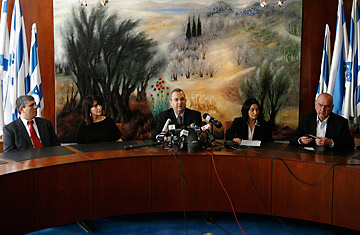
Israel's Defense Minister Ehud Barak attends a news conference at the Israeli parliament, in Jerusalem on January, 17, 2011.
A few hours after Defense Minister Ehud Barak announced he was leaving the Labor Party he chairs, a newspaper commissioned a flash poll of the Israeli public. The survey captured in a single political instant what analysts call the gradual but now nearly complete transformation of Israel’s public life from the sphere of the collective to the realm of the private.
The first point drove home the personality politics that lately dominates Israel's public life. Eight in 10 Israelis, according to the poll commissioned by the daily Yedioth Ahronoth, said Barak quit the party not over principle but for his own interests. By leaving Labor, whose more leftist members were moving toward abandoning the right-leaning coalition of prime minister Benjamin Netanyahu, Barak guaranteed that he will keep his current job — and it's a big one. Not only is he in charge of Israel's armed forces, the former commando also serves as de-facto foreign minister, since the minister who bears the formal title, Avigdor Lieberman, stands in public opposition to the peace talks that Barak and Prime Minister Benjanmin Netanyahu say they want to re-start with Palestinian leaders.
Support for the second point was less emphatic, yet shared by more than half of respondents: Barak's decision will bring about the end of the party that founded the state of Israel.
Democratic politics, of course, is nothing if not dynamic. Parties come and parties go. (Voted Whig lately?) But in its formative decades the government of Israel was almost indistinguishable from the party of Labor. David Ben-Gurion, the new nation's equivalent of George Washington, John Adams and Thomas Jefferson rolled roughly into one, headed both the party and the government it largely populated. And Labor survived Ben-Gurion's own departure, in 1965, a fact that irked many commentators after Barak invoked it on Sunday while announcing the formation of his own faction, dubbed Independence.
The announcement, which caught the political world entirely by surprise, was widely viewed as a victory for Netanyahu, head of the center-right Likud Party. By taking Labor out of the mix of parties that agree to govern behind Netyanyahu, the coalition's majority in the 120-member Knesset drops from 74 to 66. But the smaller majority is considered more stable. Labor's threats to quit had raised the specter of early elections, and the resulting uncertainty carried with it the odor of weakness. Instead, Netanyahu's office boasted of helping engineer Barak's desertion, along with four other Labor parliamentarians. (Some analysts pointed out that, in the process, the power to pull apart the coalition passed to Lieberman, whose control over his party, Israel Is Our Home, is seen as absolute.)
Labor's political obituary appeared in Monday's papers. It mentioned a long illness. The party had been leftist, then center-left, then leftist again, but that whole side of the political spectrum — championing land for peace, putting ardent hopes in engagement with the Palestinians — all but ceased to exist after the Second Intifadeh. After the 1994 Oslo Accords raised hopes for a lasting peace, Barak, then Prime Minister, raised them higher at the 2000 Camp David summit. Instead, Israelis saw waves of suicide bombings. The disillusion has yet to lift.
"The Labor Party died in the year 2000, but only yesterday was it properly laid to rest," columnist Nahum Barnea wrote on Yedioth's front page Monday. "No one wore sackcloth. No one poured ashes over themselves. This historic party, which established the state and modeled it in its spirit, for better or for worse, was given an ignoble burial."
It came on the 100th anniversary of Israel's first kibbutz, the collective that both settled the land that became Israel and infused the new nation with a spirit of shared enterprise and egalitarianism much less in evidence nowadays. Most of the collectives are, in fact, privatized, their land sold off in the marketplace that now lays first claim to bright young Israelis who once might have gone into government, likely by climbing the rungs of Labor.
"I'm certainly not helping to kill it," protests Einat Wilf, a first-term Knesset member joining Barak in the new faction, which leaves Labor with just eight seats. "On the contrary, we've cleared the way for those who want to make it a socialist-leftist opposition party."
That has not been the direction of Israeli politics in recent years, which is why Independence calls itself simply "centrist," or, the "skeptical left," in Wilf's phrase. The skepticism, she says, is directed toward the Palestinian side in any peace negotiation that might occur. If talks do resume, she calculates that any resulting agreement will be more credible coming from the current coalition than from a left wing the Israeli public regards as softheaded.
"There are those who say all you need to do is sit down with the Palestinians and the next day there'll be doves in the air and rainbows in the sky," says Wilf. "Should an agreement be possible, we believe an alliance between Benjamin Netanyahu and Ehud Barak, the pragmatic right and the skeptical left, will be one that's acceptable to the vast majority of Israelis."
